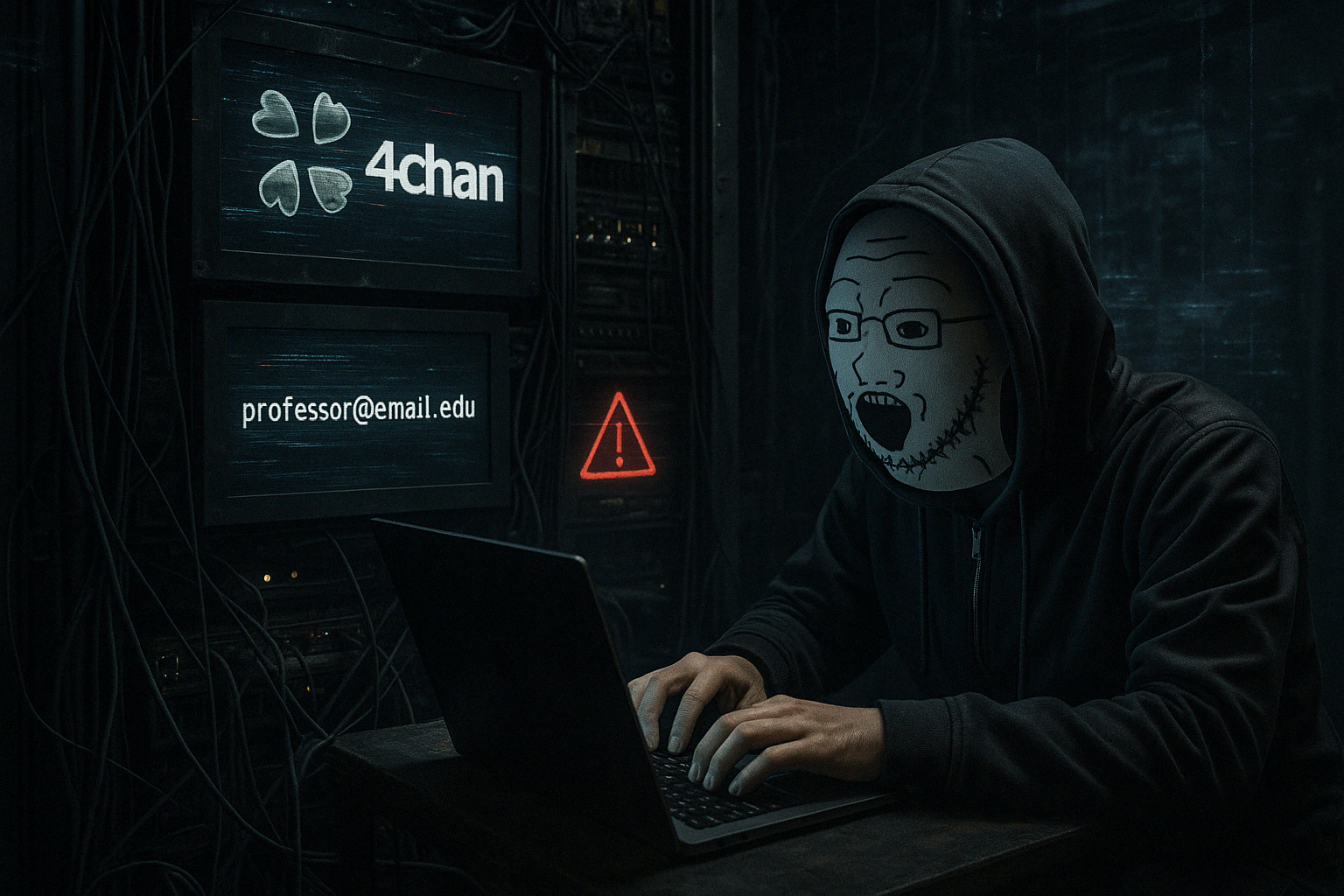Professors, Soyjaks, and Millions of Bans—Oh My.
Table of Contents
So… remember 4chan?
Yeah. That dusty, green-text echo chamber where memes are born, empires fall, and society goes to scream into the void? Well, someone just threw a digital Molotov cocktail in there, and now the entire internet smells like burning silicon and sweaty sysadmins.
In a hack that could only be described as both terrifying and hilarious, 4chan has been cracked wide open like a piñata at a LAN party. And what spilled out? Secrets. Ban lists. Professor emails. And yes, an actual red warning triangle on screen like we’re inside a bad cyberpunk visual novel.
Grab your energy drink. It’s gonna get weird.
Who Did This?
A group calling themselves the Soyjak Party.
Yes. That’s the name. Let it sink in.
Like a gang of meme-loving anarchists from a subreddit you forgot to unsubscribe from, these cyber vigilantes allegedly breached 4chan’s dusty, duct-taped backend and took everything.
And I mean everything: backend access, full shell control, mod panels, internal tools, even email addresses tied to .edu domains. It’s as if your edgy cousin’s Minecraft server just got exposed by the cast of Mr. Robot—but every character wears a Wojak mask and yells “based” between SQL injections.
Wait—Professors Were Mods?!
Yep.
Among the dumped data was an email linked to a university professor. This revelation hit like a sledgehammer to the brain. What was academia doing running clean-up duty on the digital Hunger Games?
Imagine grading midterms in the afternoon and banning furries by night.
Is this some kind of undercover sociological experiment? Is this what tenure leads to? Is this where your tuition dollars are going? (Just kidding. It’s probably the football team.)
Still, the implications are wild. Not only has the hacker collective exposed the crusty infrastructure 4chan was clinging to like your dad’s Nokia flip phone, but they also cracked open a door into how chaotic forums are moderated… and who exactly holds the mop.
The Infrastructure: Dustier Than Your MySpace Page
4chan was running on FreeBSD 10.1, which went out of support in 2016. That’s like still using Windows XP to run a nuclear power plant.
It’s digital malpractice. If this stack were a car, it’d have duct tape on the headlights, rust in the frame, and a cassette player that only plays Evanescence.
Pair that with an ancient PHP version, and it’s a miracle the site hadn’t spontaneously combusted before this. This wasn’t hacking. This was digital Darwinism.
10 Million Bans. Let That Marinate.
Yes. Over 10 million user bans were uncovered.
Some were legit: spammers, trolls, degenerates, the usual suspects. Others? Let’s just say the criteria were… fluid. Examples include:
- “Too cringe to exist.”
- “Unironically posting Sonic inflation art.”
- “Called a mod bald (true).”
We’re talking about a moderation culture that was less “policy enforcement” and more “vibes-based tribunal.”
Why This Is Actually A Big Deal (Even If You’ve Never Touched 4chan)
Whether you think 4chan is a digital hellscape or a misunderstood art project, this breach matters.
Because 4chan is where the internet’s id lives. It’s the basement. The unconscious. The spawn point of every meme your uncle shares three years too late on Facebook.
And now that basement has been kicked in, its secrets thrown into the sunlight. Which means:
- Anonymity is shakier.
- Forum culture is under the microscope.
- Mods everywhere are wondering if their burner Gmail account is next.
This was 4chan’s Panama Papers. But messier. And way more ironic.
The Soyjak Party’s Real Message?
It wasn’t just about the lulz.
The Soyjak Party made it painfully clear: you are not as hidden as you think, your idols have expired, and this house is built on termites.
They didn’t just deface the site—they dismantled the illusion. The illusion of invincibility. Of impenetrability. Of anonymity behind an old green text board that never bothered updating itself because chaos was the feature, not the bug.
So What Happens Now?
Hard to say.
4chan might patch up, slap some digital tape on the cracks, and try to carry on. Or this might be the beginning of a grand decentralization—users splintering into encrypted Discord servers, obscure forums, or yet-to-be-invented platforms with AI mods and Web3 avatars.
But one thing is certain: The internet has changed.
The old myth of the invincible troll kingdom has been pierced. And not by law enforcement, not by politicians, but by a gang of ironic shitposters with a point to prove.
TL;DR (Because Let’s Be Honest, You Skimmed)
- 4chan got hacked. Fully. Internals, mod tools, everything.
- Hackers called “Soyjak Party” did it. Wild name, serious impact.
- University professors were involved as moderators. Seriously.
- Over 10 million user bans exposed.
- Site ran on ancient tech. Like, should-have-been-in-a-museum old.
- Chaos ensued. Now? Everyone’s watching.
Final Thought:
Somewhere, in a dark corner of the internet, a Soyjak-masked hacker is sipping expired Mountain Dew and laughing. Not because they destroyed something. But because they revealed something.
And if you’re feeling some combination of “horrified,” “weirdly amused,” and “existentially itchy”—welcome to the new internet.
